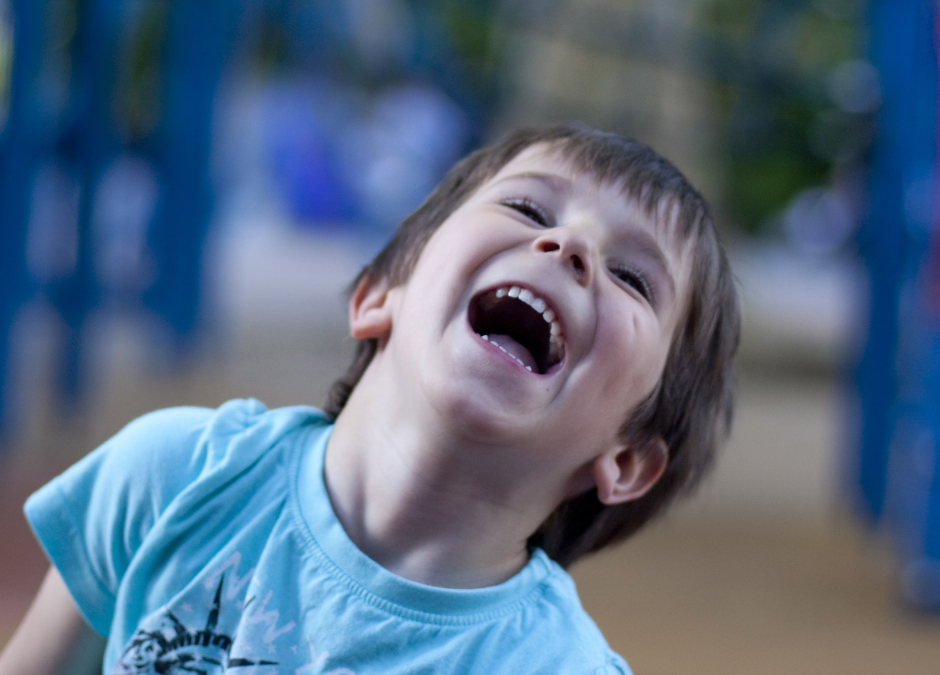Laughing is Good for You
A child’s laughter can raise your spirits and bring a smile to your face. According to the AAP, there is power in play and laughter. But what is laughter, why is it good for us, and how can we make children laugh?
Laughter is a pleasant physical reaction consisting usually of rhythmical, often audible contractions of the diaphragm and other parts of the respiratory system. It is a response to certain external or internal stimuli. Laughter can arise from such activities as being tickled, or from humorous stories or thoughts. Most commonly, it is considered an auditory expression of a number of positive emotional states, such as joy, mirth, happiness, or relief.
While this explains what we see when someone laughs, it doesn’t explain what is going on in the body. Physically, a good laugh releases endorphins – the body’s natural pain relievers. This results in reduced stress, anxiety, and depression, improved sleep, lowered blood pressure and blood sugar levels, and improved circulation. Amazing what a simple laugh can accomplish?
Laughter’s ability to diffuse stress is just one of many reasons why it’s a critical part of a child’s development.
Having a sense of humor plays an important role in developing self-esteem, learning to problem solve, develop resilience, and develop creativity. Kids who can laugh at their mistakes are more likely to accept that no one’s perfect. It can also change the focus from the mistake to solving how to avoid the same mistake in the future. Laughter and humor build resilience, so children are better able to adapt to adversity, stress, trauma, tragedy, and threats. Another benefit is that humor helps kids develop creativity because it teaches them to look at things from an unusual perspective. Children who laugh a lot are generally happier and more optimistic overall.
Laughter is the physical response to humor. Humor is generally considered a desirable personality trait and people with a good sense of humor tend to form friendships easily. This helps them feel better about themselves and boosts their self-esteem. Children learn the healing power of laughter at an early age when they see loved ones laugh trying to cheer sad friends. This helps them understand the essential social skills of empathy and sympathy. Socially, laughter may be used to diffuse a tense situation. Laughter is a good distraction from negative emotions such as guilt, stress, and anger.
You probably noticed – laughter is contagious!
When we hear others laughing, we tend to start laughing too – even if the joke or situation is not that funny. Everyone who laughs reaps the benefits.
You don’t have to be a clown to make the children in your care laugh. Child find different things funny at different ages. Here are some ag- appropriate suggestions for bringing laughter into your day.
- Babies: Although they don’t understand humor, babies respond to physical stimuli. Gently tickle the infant, blow raspberries on their bellies, and play games like “This little Piggy” and “Peek-a-boo”.
- Toddlers start to understand humor – especially physical humor with an element of surprise. They start to like rhymes and nonsense word sand try to make others laugh. To make a toddler laugh, try speaking and singing in rhyme and nonsense words, making funny faces and encouraging them to imitate your facial expressions, and saying “I’m gonna get you” while crawling after them and treating them to a cuddle when you catch them. Pretending to fall or to drop something can also be humorous to a toddler.
- Preschoolers love simple visual and verbal humor. Silly antics, songs, games funny rhymes and stories can make them laugh. They also find bodily functions humorous – burping, passing gas, grumbling stomach, and potty noises. To make them laugh, point to pictures of animals, but make the wrong sound (‘moo’ when you point to a pig), stand by a mirror with the child and see who can make the funniest faces, or tell the child you found a new hat and put a t-shirt on your head. Sing f un songs with silly choruses.
- Once kids start school, humor becomes a little more refined – but not all the time! Slapstick humor, wordplay, and exaggeration become funnier to this age group and the child will start to learn the pleasure of telling jokes. School age children have a better understanding of words and start using puns, riddles, and other types of wordplay. To get your school-aged children to laugh, share puns and jokes with them [laugh out loud], watch comedic TV shows and movies, have a talent show and see who can come up with the funniest routine, have a laughing contest, and play fun games like Twister, charades, and Pictionary.
Making kids laugh is one of the top joys of caregiving. It’s never too early to start instilling a good sense of humor in children. Be a good humor role model and help children benefit from having a well-developed sense of humor. Everyone will reap the benefits!
If you are a nanny and want to get certified to provide better care for kids, check out the Nanny Institute which has 7 online nanny certification programs.


Recent Comments